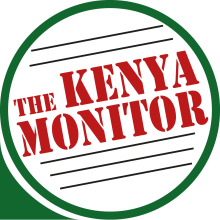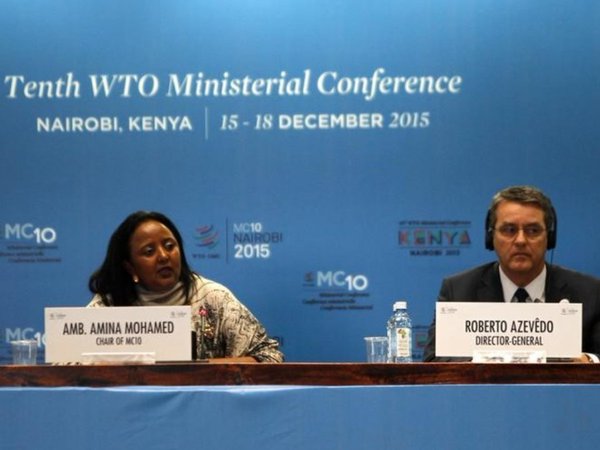As the World Trade Organization’s (WTO) 10th Ministerial Conference concluded in Nairobi, many felt that it failed to earn the poorest countries any advantage.
Activists at the meet felt that the poorest nations were short-changed and that the rich nations came out the winner – again.
Several organizations, especially Non-Governmental entities protested but it remains to be seen what will come out of the Nairobi talks.
11:29 #NAIROBI Koreans holding demonstrations in Nairobi CBD against #WTO #MC10 pic.twitter.com/3dIs1xWLob via @MombasaCGW
— Ma3Route (@Ma3Route) December 17, 2015
Activists staged protests to denounce the food #WTO development model. #UN #Nairobi https://t.co/HNbNyZMSZ2
— teleSUR English (@telesurenglish) December 17, 2015
#WTO: Dumping Responsibility on Third World #Farmers Yet Again #foodsovereignty https://t.co/3rgm1foOEX pic.twitter.com/bbNoYDWIXS
— Grassroots Intl (@GrassrootsIntl) December 16, 2015
But, Information Technology ‘won big’ as the US and China signed a deal that will see a great deal of savings on IT products and services and which the United Nations Environment Programme (UNEP) may have capitalised on to launch the Environment and Trade Hub to achieve the 2030 agenda for sustainable development.
Technology #Trade Deal Reached at #Nairobi #WTO Ministerial (#MC10) https://t.co/SCUsqXW0Tk. Details via @ICTSD_Bridges. #ITA
— Bridges Weekly (@ICTSD_Bridges) December 16, 2015
WTO members conclude landmark l.3 trillion IT trade https://t.co/7et7LU1xBa Congrats to #WTO members moving agenda forward
— Patricia Francis (@patrfrancis) December 16, 2015
The initiative by UNEP is aimed at assisting countries use sustainable trade as a vehicle for achieving the 2030 agenda goals.
When launching the initiative, UNEP Executive Director Achim Steiner said,
“UNEP is already working directly with many governments and other stakeholders to implement an inclusive green economy in countries across all continents.”
He added,
“The Hub holds enormous potential to build on this experience and help unlock the true capabilities of developing countries, using trade as a motor for sustainable development and environmental protection, and benefitting every single one of us.”
The Hub was formally launched at an event on the sidelines of the WTO’s 10th Ministerial Conference in Nairobi.
UNEP co-hosted the plenary session titled
“Trade and the 2030 Sustainable Development Agenda”
with the International Centre for Trade and Sustainable Development (ICTSD) at the opening of ICTSD’s Trade and Development Symposium.
Trade is a key means of implementation for the Sustainable Development Goals (SDGs) and Steiner underlined the many ways in which cross-border trade, not to mention investment, now drive global economic growth.
Sustainable trade can impact positively on goals across the board, in areas such as food security and sustainable agriculture, sustainable management of water and sanitation, access to modern energy, and mitigating and adapting to climate change.
“We need to ensure that the 2030 Agenda for Sustainable Development, including the SDGs and the Financing for Development Action Agenda, are fully incorporated into national trade policies and trade agreements that are negotiated at bilateral, regional and international levels,” said Steiner.
Many countries are unable to make effective use of international markets, gain access to sustainable global value chains to equitably grow their economies, and attract overseas investment to build modern, sustainable industries and contribute to global value chains. African countries, for example, account for less than two per cent of international trade.
Countries need support to change this – not only from UNEP and other international organizations, but from multiple partners around the world dedicated to working with countries to build their capacity to engage in sustainable trade.
The Hub aims to enhance the capacity of countries to design and implement trade policies that foster environmental sustainability and human well-being; to assist countries in the realization of trade opportunities arising from a transition to greener economies; to strengthen the sustainability aspects of cross-border trade and investment agreements in negotiations; and to realize a shift of trade practices and trends to more sustainable pathways.
The initiative offers the capacity to building services for developing countries such as tailored technical trainings to support international, regional and national design and implementation of sustainable trade and investment policies;
It also targets stakeholder trainings; technical assistance in designing trade and environment related agreements; development of tools, methodologies and indicators for sustainable trade;
The Hub will also help with the identification and dissemination of best practices; support to stakeholder consultations and national, regional, and international dialogues on advancing sustainable trade and the identification of sector – or region-specific sustainable production and trade opportunities.


